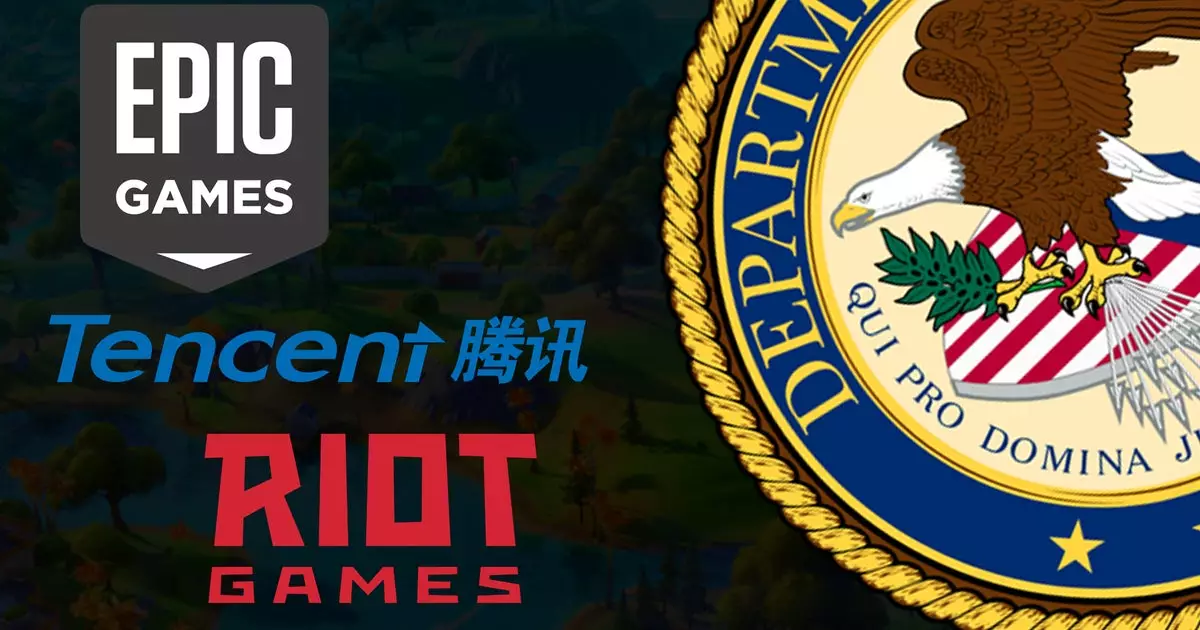The recent resignation of two directors from the board of Epic Games has brought antitrust scrutiny back into the limelight, highlighting the precarious balance of power among major players in the video game industry. This shakeup was precipitated by an investigation led by the US Department of Justice (DoJ), which examined potential violations of antitrust laws. The focus of the inquiry arose from the unique relationship between Epic Games and Tencent, a significant player in the industry with a substantial ownership stake in Epic’s operations.
Antitrust laws exist to ensure healthy competition and prevent monopolistic tendencies among corporations. In the case of Epic Games, the scrutiny centers around the dual roles of directors serving on boards of competing companies, which could lead to conflicts of interest and unfair advantages. With Tencent also owning Riot Games—a direct competitor of Epic—this scenario presents a significant ethical and legal dilemma that could undermine the principles of fair market competition.
The two directors who stepped down, Ben Feder and David Wallerstein, were notably positioned at the intersection of corporate interests. Feder had been with Tencent as the President of International Partnerships for several years and previously held the CEO position at Take-Two Interactive, a major publisher that is also aligned with Tencent’s business strategies. His experience within such powerful entities undoubtedly provided him with valuable insights but also placed him at the heart of a potential conflict of interest.
Wallerstein, who served as the Senior Executive Vice President at Tencent until early 2023, further complicates the narrative. His departure from the board appears to be a strategic move to mitigate ongoing scrutiny as the DoJ continues its investigation. It can be inferred that the resignations represent an acknowledgment of potential improprieties that could lead to more severe legal ramifications for both Tencent and Epic.
These departures signal a conscious effort to maintain Epic Games’ integrity and reputation during a time when transparency in corporate governance is in high demand. For many observers, these resignations mark not just a compliance measure but a larger commentary on the need for ethical practices within the tech sector.
The fallout from this investigation has already prompted Tencent to take corrective action, notably agreeing to amend its shareholder agreement with Epic Games to eliminate the possibility of appointing directors to its board in the future. This move is indicative of Tencent’s desire to quell any further scrutiny and restore a semblance of normalcy to its relationship with Epic.
The DoJ’s announcement also made it clear that while these restructuring efforts are in motion, neither Tencent nor Epic has admitted to any liability. This stance serves as a reminder that in complex regulatory environments, companies must navigate legal frameworks while also protecting their business interests. The implications of this investigation extend beyond the immediate resignations, as companies now must scrutinize their governance structures to avoid potential conflicts.
The examination of Epic’s boardroom dynamics sheds light on a more significant trend within the gaming industry. The rise of conglomerates and their influence over multiple companies creates opportunities for power imbalances that can stifle competition. Notably, this isn’t the first instance wherein substantial corporations have faced antitrust scrutiny. Past controversies involving Valve and Microsoft’s acquisition of Activision Blizzard demonstrate the persistent challenges faced by regulators attempting to maintain competitive markets.
As the gaming industry continues to evolve rapidly, with mergers and acquisitions becoming more commonplace, the importance of antitrust laws becomes increasingly paramount. The long-term health of the gaming ecosystem will depend on ensuring that no single entity can monopolize resources or stifle innovation through unfair advantages.
The recent developments at Epic Games highlight critical issues relating to antitrust regulations and corporate governance within the gaming sector. The resignations of Feder and Wallerstein are not mere procedural changes; they symbolize a broader commitment to fostering fair competition. As the industry shifts towards greater consolidation, maintaining vigilance against monopolistic practices will be essential in nurturing an environment where competition thrives and innovation flourishes.

